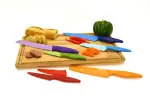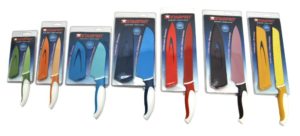
5 knives you should add to your collection
From slicing steak to dicing an apple, every kitchen should be equipped with a good set of knives. Whether you already own a set or plan to purchase a few to add to your collection, you'll want to know which knives are essential in your kitchen. Sharpen your skills when it comes to knives by taking a look at these must-haves.





 The secret to any great knife is its sharpness. Get your knives sharpened about once a year for ease of use and safety. Many at-home sharpeners will give good results, however, you may want to have them professionally sharpened.
Washing your knives by hand is highly recommended. The dishwasher isn't great for cleaning your knives because the aggressive nature of most dishwashing detergents will cause spotting on the blades and damage to the handles. After you clean your knives by hand, they should be stored individually in a sheath or in a knife block.
The secret to any great knife is its sharpness. Get your knives sharpened about once a year for ease of use and safety. Many at-home sharpeners will give good results, however, you may want to have them professionally sharpened.
Washing your knives by hand is highly recommended. The dishwasher isn't great for cleaning your knives because the aggressive nature of most dishwashing detergents will cause spotting on the blades and damage to the handles. After you clean your knives by hand, they should be stored individually in a sheath or in a knife block.

- Chef's Knife — This is probably the most important and useful knife to have in your collection. A chef's knife can be used for most of your kitchen tasks. The long blade makes the knife efficient for slicing meat, vegetables, and fruit.
- Paring Knife — A paring knife is best suited for smaller items that require attention to detail. Because the blade is significantly shorter than a chef's knife, it works well on strawberries, garlic, and shallots. Avoid using a paring knife on harder foods such as carrots or apples, because it will require too much pressure to force the cut, making it dangerous.
- Bread Knife — Also known as a serrated knife, the bread knife is obviously useful for cutting bread, but it can also tackle the job of cutting pineapple, watermelon and other fruits and vegetables with waxy surfaces. The jagged edge can grip the exterior, making it a safe choice. A serrated knife should be used for slicing, not chopping.
- Utility Knife — Larger than a paring knife, but smaller than a chef's knife the utility knife is the go-to knife in your kitchen. From cutting sandwiches to slicing meat, the utility knife can handle most tasks.
- Santoku Knife — This versatile knife can slice, dice and mince. The Santoku is shaped like a narrow-bladed cleaver and allows for a well-balanced grip when preparing many foods.
 The secret to any great knife is its sharpness. Get your knives sharpened about once a year for ease of use and safety. Many at-home sharpeners will give good results, however, you may want to have them professionally sharpened.
Washing your knives by hand is highly recommended. The dishwasher isn't great for cleaning your knives because the aggressive nature of most dishwashing detergents will cause spotting on the blades and damage to the handles. After you clean your knives by hand, they should be stored individually in a sheath or in a knife block.
The secret to any great knife is its sharpness. Get your knives sharpened about once a year for ease of use and safety. Many at-home sharpeners will give good results, however, you may want to have them professionally sharpened.
Washing your knives by hand is highly recommended. The dishwasher isn't great for cleaning your knives because the aggressive nature of most dishwashing detergents will cause spotting on the blades and damage to the handles. After you clean your knives by hand, they should be stored individually in a sheath or in a knife block.
